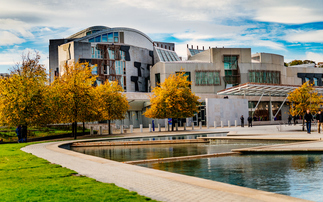UPDATED: Paris Summit delivers historic international climate deal
Ministers from nearly 200 countries today agreed an historic deal committing them to tackle climate change and deliver a net zero emission economy this century.
After some late drama that saw the agreement delayed by nearly two hours as ministers haggled over the fine detail of the text, the deal was approved by 195 countries, committing governments to limiting global average temperature increases to "well below 2C" and striving for less than 1.5C of warming.
"I see no objection," said COP President Laurent Fabius at 7.25pm Paris time as he announced the adoption of the agreement and the cavernous conference halls at Le Bourget erupted in cheers. Some minutes later Fabius was told he needed to bang the gavel to confirm an agreement had been reached. He gavelled through the deal, delivering a new global climate change agreement.
After more than 48 hours of marathon round-the-clock talks, the deal saw ministers approve the network of national climate action plans, known as INDCs, and back a new system of five year reviews that will urge countries to strengthen their decarbonisation strategies on a regular basis.
The agreement was nearly derailed following a last minute row over some errors that were spotted in the text. Richard Kinley, deputy executive secretary of the UN's climate change secretariat, admitted some errors had been made in the draft text "in haste by colleagues that have not slept for days".
Some rich nations are understood to have complained about article 4.4 in the text, which originally stated developed countries "shall" continue taking the lead by undertaking economy-wide absolute emission reduction targets. After a lengthy debate, Kinley confirmed this evening the text was supposed to read "should".
The new global climate deal includes a target to keep temperature rises "well below 2C" and to strive towards 1.5C for the first time. It also promises to deliver on a scientific target that is being widely interpreted as requiring net zero emissions this century.
On funding, the deal commits to $100bn a year of climate finance from 2020 and it introduces new mechanisms for climate adaptation.
In a positive move for businesses, the deal also includes support for carbon markets.
Responding to the news, British Prime Minister David Cameron said the UK was "leading the way" on cutting emissions, adding the deal means "the whole world has signed to play its part in halting climate change".
"In striking this deal, the nations of the world have shown what unity, ambition and perseverance can do," he said in a statement. "Britain is already leading the way in work to cut emissions and help less developed countries cut theirs - and this global deal now means that the whole world has signed to play its part in halting climate change. It's a moment to remember and a huge step forward in helping to secure the future of our planet."
EU Climate Action and Energy Commissioner Miguel Arias Cañete said the deal represented a "major win for Europe", because it had achieved its key objectives on ensuring countries submit five yearly reviews of their national targets alongside a long-term goal.
"But more importantly, it is a major win for the global community," he added. "Now, what has been promised must be delivered. Europe will continue to lead the global low-carbon transition we have agreed."
Green business groups and leading business figures were united in their praise for the deal.
Paul Polman, chief executive of Unilever, said the deal provides "an unequivocal signal to the business and financial communities, one that will drive real change in the real economy". "This agreement establishes a clear path to decarbonize the global economy within the lifetimes of many people alive today, reaping the benefits of accelerated infrastructure investment, cleaner air, greater security and a growing low carbon global economy," he added.
His comments were echoed by Phillipe Joubert of the Corporate Leaders Group on Climate Change who said the deal marked "an historic milestone". "Business leaders and investors now have a clear direction of travel, a global framework to speed up and scale up of their solutions," he said. "The Paris agreement will accelerate the shift to a new sustainable, equitable and decarbonised world. We thank everyone who's contributed to this historic achievement, including visionary leaders from business and governments."
Green investment groups were similarly upbeat. "Institutional investors called on Governments before and during COP21 to provide an unequivocal signal sufficient to accelerate the low-carbon transition," said Stephanie Pfeifer, CEO of the IIGCC. "By setting a long term goal for net zero emissions in the second half of this century, and by putting in place a five year review cycle sufficient to require ever more ambitious domestic action to deliver an irreversible downward trend in emissions, this agreement provides an unequivocal signal for investors to help escalate the development of low carbon infrastructure and energy systems across the globe."
Dirk Forrister of the IETA emissions trading body also welcomed an agreement that promises to support the development of international and national carbon markets. "We congratulate governments on a historic agreement, grounded in a new spirit of cooperation," he said. "With the endorsement of more than 190 governments and a strong foundation for markets going forward, businesses can begin planning for a vibrant new future."
Speaking in the plenary session that followed the adoption of the agreement, Secretary of State John Kerry said the Paris deal would send a message to the global marketplace and help unleash the power of business innovation in order to tackle climate change.
"We are sending literally a critical message to the global market place," he said. "It won't be governments that actually make the difference. It will be the genius of the American spirit, it will be business unleashed."
Meanwhile, CBI director general Carolyn Fairbairn said the Paris deal "heralds an exciting opportunity for business".
"We now have a climate deal agreed by the world's leaders that puts us on a sustainable low-carbon path and which can provide the framework for business to invest with confidence," she said. "It will now be for governments to show how they plan to turn global ambition into national reality. Businesses will want to see domestic policies that demonstrate commitment to this goal and none more so than in the UK."
This article is part of BusinessGreen's Road to Paris hub, hosted in association with PwC.








